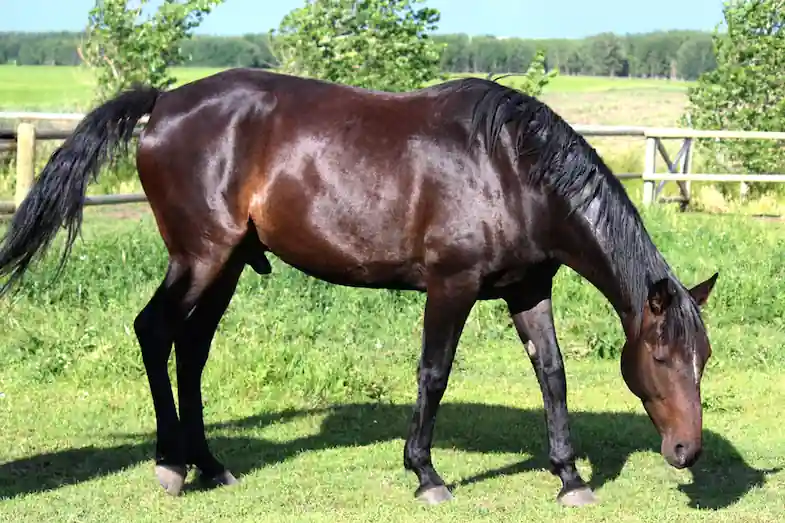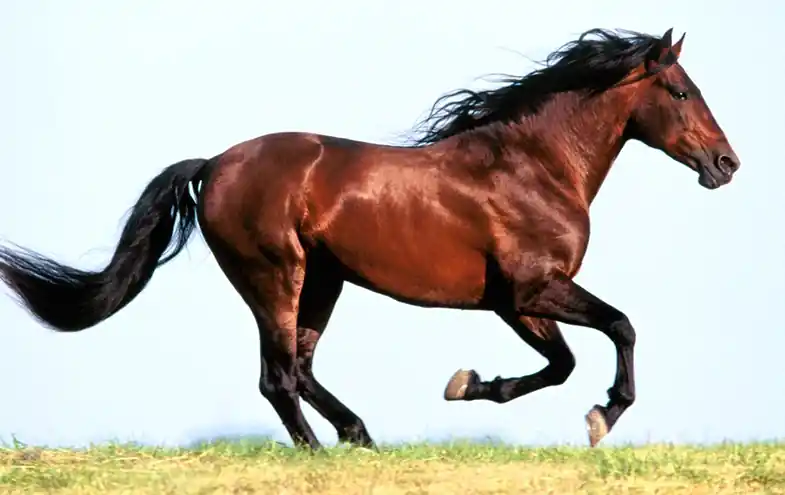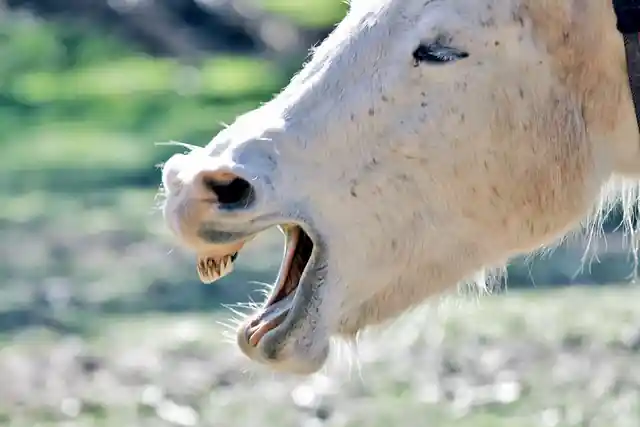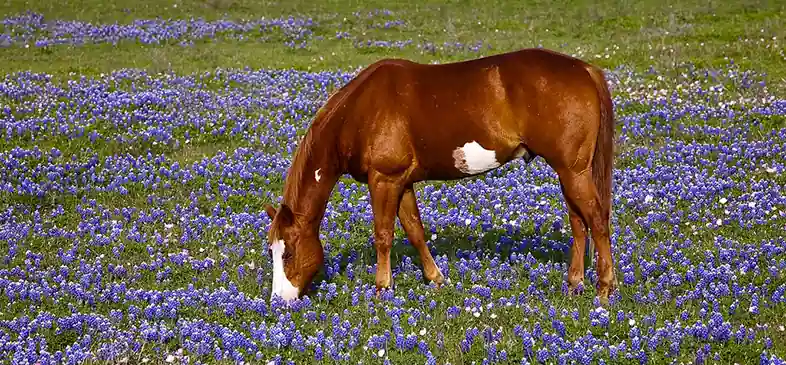You might already know that horses can’t vomit but do you know why this is the case? Until recently neither did I, I used to think it was because they don’t have a gallbladder but it turns out that, while they don’t have one, it’s not the reason why they can’t vomit.
Why can’t horses vomit? Horses can’t vomit because of the strength of their cardiac sphincter (the muscle around the esophagus that leads into the stomach). This muscle is so strong that once food has passed through, it won’t open again, therefore acting as a one-way valve that won’t allow the contents of the stomach to travel back up the esophagus.
There are also a number of other reasons why it’s almost impossible for a horse to vomit besides their cardiac sphincter. Unlike most other animals, the stomach of a horse is positioned at more of an acute angle (in relation to the esophagus) which means that even if the valve could open to let food back up it would still be very difficult for the food to do so. This combined with a very weak and poorly developed vomiting reflex means that horses simply haven’t evolved to be able to vomit.

Why would a horse not throw up?
Nobody knows for sure why horses have evolved without the ability to vomit but there are two very plausible reasons for this and they both involve the instinct to survive. There is also a third reason why horses can’t vomit but this is more of a theory than else.
Fussy eaters
While your domesticated horse may eat something then think about the consequences, in the wild horses are extremely fussy eaters that generally know what’s okay for them to eat and what isn’t. This means that horses will nuzzle their way around a harmful plant to get to the ‘good to eat’ one behind it. This, combined with the fact that horses are continual grazers that have small stomachs (meaning they only eat small amounts at one time that often pass through the stomach within 15 minutes) means that they haven’t evolved the ability to vomit because they didn’t ingest any toxins, or at least only ingested a small amount. Sadly in a domestic situation, this isn’t always the case and horses are exposed to plants they wouldn’t normally be in the wild which is why we need to be so careful what we feed them. If you’re not sure what you should and shouldn’t be feeding your horse then these articles will help you:
Quick getaway
Being prey animals horses have always needed the ability to run at a moment’s notice and as fast as they can. This need for speed has meant that a horse’s intestine is designed to move back and forth, giving the horse the flexibility and lung space to gallop at an incredible 88 km/h (55 mph). While you might not think this would matter it means that the constant movement of the intestines creates a hammering action on the stomach that would induce vomiting in most other animals. This means that if a horse’s vomit reflex was stronger a horse would vomit every time it ran, resulting in them at best losing valuable nutrients and at worst being caught by a predator.

Overeating
Due to their habitual grazing natures horses are constantly passing food through their digestive tracts which means that in the wild at least, they don’t tend to overeat or gorge on their food. This means that their stomachs very rarely get full so don’t need to vomit to remove excess food or gases, although as we all know they’re more than capable of expelling gases from the other end!
Horses sometimes may appear to vomit, but actually aren’t
Some people will insist they’ve seen a horse vomit but this is almost certainly not the case. On occasions it can appear as though a horse is vomiting but because the food (or whatever substance) is coming from their esophagus rather than their stomach they’re not actually being sick. Instead, it’s likely to be they’re either regurgitating or choking.
Regurgitating
Unlike vomiting (which is a muscular action) regurgitation is a passive one and happens when ingested food that hasn’t made its way to the stomach yet oozes from the mouth and more commonly the nose. There are can a number of reasons for this but the most common is a condition known as grass sickness. This is where the part of a horse’s nervous system that controls the gut is damaged, resulting in the muscles of the esophagus becoming relaxed and loose. This prevents all of the food from making its way to the stomach and instead appears as discharge. If this happens to your horse you should speak to your veterinarian for advice.
Choking
Just like us horses can get food stuck in their throats and will arch their necks and raise their heads in an attempt to dislodge the offending item, unlike us though it doesn’t affect their breathing. Despite not affecting their breathing, choking can still be serious (and distressing for the horse) so it’s important you remove whatever’s stuck as soon as possible or, if you’re not able to, call your veterinarian immediately. While you’re waiting for help to arrive make sure you’ve removed all food and water from your horse and try to keep them calm if possible.

What are the advantages of horses not being able to vomit?
It’s unclear as to whether horses became fussy eaters because of their inability to vomit or if they never evolved to be able to vomit due to their picky natures but one thing that’s for sure is that modern horses have an innate ability to know what’s good for them and what isn’t.
Along with aiding their survival, the fact that horses can’t vomit has also helped to protect their esophagus from acid damage. This is because horses constantly produce gastric acid (even when they’re not eating) in order to help them break down their food quickly. In fact, they can produce around 60 gallons (60 liters) of acid every day which, if the valve didn’t stay closed, would do some serious damage to the esophagus.
What are the disadvantages of horses not being able to vomit?
I’m sure that many of us would think not being able to vomit is a great advantage and that there are no downsides to it but animals (and humans) need to vomit for a reason (normally to remove toxins or relieve pressure from the stomach) and horses are no different. While they can’t vomit it doesn’t mean they don’t suffer from the same causes.
While a horse may still ingest toxins (typically because they’ve been fed something bad) or need to dispel stomach gases they clearly can’t do this through vomiting. Instead, they are at a higher risk of suffering from severe digestive disorders or complications such as colic or a ruptured stomach.
Can I make my horse throw up something they’ve eaten?
Whatever you do, NEVER give your horse anything to make them vomit, it will just make a bad situation far worse and could be catastrophic. If you think your horse has eaten something toxic or has some other serious digestive issue then it’s imperative that you don’t hesitate and call your veterinarian immediately. Doing this could, in some cases, literally be the difference between life and death.
You should also keep your horse away from anything toxic and make sure that he has plenty of fresh water to drink, this can sometimes help to flush some of the toxins out of your horse’s system. Also, remove anything that he could eat until your vet has seen him.

Will horses die if it throws up?
If a horse really is vomiting then sadly there is every chance they will die, this is because although it’s extremely difficult for a horse to throw up it’s not completely impossible and normally involves irreparable injuries to their stomach. If a horse really is vomiting (rather than choking or regurgitating) then it’s of paramount importance that you call your veterinarian without hesitation. The reason it’s so important is that because for a horse to vomit it’s highly likely they’ve ruptured an organ in their digestive system (most commonly their stomach but not always). This rupture has caused the muscles in the cardiac sphincter to collapse and therefore allow food and gases to pass back up the esophagus.
Your veterinarian may not be able to help your horse to survive (although in some cases they can) but they will certainly help them to be more comfortable.
Can horses burp?
Horses aren’t able to burp because burping involves the same set of muscles and actions as vomiting. To all intense and purposes, vomiting and burping are the same thing and employ the exact same muscles. They both allow substances to travel from the stomach back up the esophagus, food in the case of vomiting, and air in the case of burping. If your horse needs to get rid of gases in his stomach then he’ll pass that through his digestive tract and out of his anus instead.
Some horses may sound as if they’re burping but the air is actually coming from their esophagus instead of from their stomach and is normally due to vices such as windsucking to cribbing. In these cases the air travels down the esophagus and then back up and out of the mouth, it never enters the stomach so technically isn’t a burp.
Further reading
- Are horses okay eating wet grass?
- How to care for your new horse
- What does it mean when a horse is lame?
- Why do horses show their teeth?
- Is your horse getting enough to drink?
- Why do horses paw at the ground?
- Keep a horse on a budget, without compromise
- How on safely feed your horse treats
- Equine euthanasia: your questions answered
- 7 surprising things your horse should be eating
I hope you found this article helpful. If you did I’d be grateful if you could share it please as it would really help me.
Recommended products
Over the years I have tried hundreds of different horsey products, from various blankets and halters to different treats. Some I’ve loved, others I’ve hated but I thought I’d share with you my top all-time favorite products, the ones I never leave the yard without. I’ve included links to the products (which are in no particular order) that I really think are great.
- Horse Knots by Reference Ready – If you’re like me and enjoy pocket reference guides then you’ll love this knot tying guide. These handy cards can easily fit in your pocket or attach to the saddle for quick reference. They’re waterproof, durable and are color coded to make them easy to follow.
- Mane ’n Tail Detangler – Even if you never show your horse you’ll need to detangle his tail from time to time (and possibly his mane too) which is always a challenging chore! I’ve found that if I run a little bit of detangler through my horse’s tails every few days it stops them from getting matted up and makes combing them easy, even if they’re coated in mud. I don’t know if I should admit to this or not but it also works wonders on my hair.
- TAKEKIT Pro clippers – Over the years I’ve tried a lot of different clippers and while some were obviously better than others I found these to be by far the best. They are heavier than a lot of other clippers but for me, that’s a good thing, it makes them feel more sturdy and hardwearing. On top of that they have a range of speeds so are just as good for clipping your horse’s back as they are his face. I also like the fact that they come in a handy carry case but that’s not for everybody. The company that makes them is super good and incredibly helpful too, a real bonus these days. The only thing I wasn’t keen on was the fact that it doesn’t come with any oil, but that’s not a major problem as it’s not difficult to buy lubricant.
- Shire’s ball feeder – There are so many boredom buster toys out there but I like to use these every day, regardless of whether or not my horses are bored. I find that it helps to encourage my horses to problem solve by rewarding them with treats (or pieces of fruit) but it also mimics their natural grazing behavior which helps to keep them calm and de-stressed.
- Horse safe mirror – This is a strange one that many people are surprised about but I like to put horse safe mirrors in the trailers as well as in the quarantine stalls. It helps to prevent the feeling of isolation by giving the impression of other horses being around. Being herd animals horses can get extremely stressed when they feel that they’re on their own but with these stick-on mirrors, they believe that at least one other horse is with them.
- Rectal thermometer – I know this isn’t glamourous at all but it’s vital for your horse’s well-being to be able to check their temperature and a rectal thermometer is the easiest way of doing this which is why I’ve added it to the list.
Shopping lists
I’ve also put together a few shopping lists of essential items that I’ve found helpful over the years. I’ve broken the lists down into different categories rather than put everything in one massive list 😉
